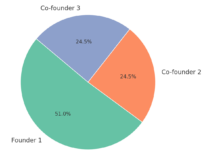
In a speech in Paris, in 1910, Theodore Roosevelt remarked the often encouraged, “Comparison Is the Thief of Joy.” That, when we compare ourselves to others, we rob ourselves of our own happiness as, through comparison, we either feel a sense of inferiority or superiority.
What we see in entrepreneurship and among founders is this manifest as something referred to as imposter syndrome, the misleading but persistent feeling of self-doubt or inadequacy, despite evident success, which misaligns reality with one’s internal perception, undermining confidence and self-worth. Feeling imposter syndrome nearly reinforces Roosevelt’s mental health related turn of the phrase, encouraging that entrepreneurs too should keep their head down, execute, and seek validation.
There couldn’t be any notion more harmful to entrepreneurs.
Comparison is the Gift of Opportunity
Starting a venture distinct from existing businesses (a startup), entrepreneurs must act to avoid the causes of failure more than hoping they are essentially unique among mortals, themselves likely to be the 1% that greatly succeeds. Entrepreneurs are taking on the different, the broken, the new, and the difficult, hoping to make the world a better place while creating value in the process, doing so without comparison (a competitive analysis) is not only dangerous, but also simply stupid.
Entrepreneurship is in many ways, a world in which good intentions can seem harsh, while positive support is actually harmful.
You need to be told your baby is ugly, it’s harsh, but it helps you avoid wasting your time and money.
That entrepreneur program that encourages that everyone can do it, isn’t inspiring, it’s misleading people who can’t, or shouldn’t, that they should pay to try.
Comparison is a competitive analysis and the only way you can actually determine if an opportunity for a startup is NOT through customers but competitors: Are there any? Can you compete? How do they succeed? Can you achieve that or accomplish other things necessary? Can you overcome their accomplishment?
Most entrepreneurs don’t do this and as a result, most fail.
Common Pitfalls that Entrepreneurship Programs Should Help Startups Avoid
What sparked this consideration of comparison is that I was asked provocatively, since I have a tendency to be critical of incubators and accelerators that aren’t actually helping founders, “what should we demand of programs?”
If you run down the list of what causes failures (overwhelming such that arguably all startups fail because of this) we have three areas of focus:
- Team
- Marketing
- Location (though this is really just a subset of #2)
So, rather, what are some common pitfalls that GOOD entrepreneurship programs MUST help startups avoid?
Notice, the CAUSES of failure is not in fact what most entrepreneurship programs offer (or claim to offer). I did a brief look at a dozen local incubator websites to find these are the benefits typically promoted:
- Access to capital
- Coworking space
- Networking
- Free credits to HubSpot
- AWS infrastructure
When a startup space or entrepreneurship program is leading with these benefits, they probably aren’t actually doing what’s meaningful to help. Ask yourself, is there anything there that you actually need?
TEAM
What causes a failure because of team could be any number of things from the wrong skillsets, inexperience, misalignment, life changes, and irreconcilable disagreement.
Meaning an entrepreneurship program should do what with and for you?
- Personality assessments
- Developing Mission and Vision
- Clarifying personal and startup NEEDS and desires, both now and in the future
- Teaching the makeup of a startup that tends to work
- Aligning priorities and expectations
- Providing team agreements that require vesting and address failing to perform
All of this is well researched. We know which personality types tend to perform as entrepreneurs and which personality types work well together. We know the skills and experience required in a startup team likely to succeed.
MARKETING
Marketing is not promoting what you’re doing! If you think it is, you’re already likely to fail. Study the market, know what might work, how, what’s valued, know the competition, know the investors, and know what has failed before. We can tell you’re likely to fail if you’ve already built and MVP or send a pitch deck seeking funding (as it’s clear you didn’t to this first and foremost).
Meaning an entrepreneurship program should do what with and for you?
- Competitive analysis
- SWOT analysis
- Communication development and practice
- Effective content creation
- Market research
- Market (which is inclusive of and more than customer) validation
LOCATION
ARE YOU IN THE RIGHT PLACE?
One of the most repeated sayings in marketing is “location, location, location” because this alone will cause your success or failure…
- Right city? Or are you trying where you are because you want to be there?
- Right country? Just because you live there… if it’s better elsewhere?
- Downtown? Ah, I see, are all best resources for that sector downtown? Isn’t it expensive?
- Website or Mobile? Sure, you’re a mobile developer so you think so… do you KNOW?
- iOS or Android? “But Paul, everyone loves iPhone and I’m an iPhone developer”
- Facebook? “No, our customers aren’t on Facebook.”
The work to determine the ideal location is what we call marketing. When a founder proclaims they aren’t ready to do marketing (or worse, an advisor or investor misleads a founder in the same way), we KNOW they are going to fail.
An entrepreneurship program failing any of this, should see its doors shuttered because in failing this, they are misleading you or misrepresenting what is researched and known to matter. What you might seek from an entrepreneurship program is a program director who in fact says, “you should not be here, we’re not ideal for that.”
I often look at this in reverse when qualifying a program:
- LOCATION: Is the program pushing that here is best for you? Is the program pushing that HERE in particular is capable of helping everyone? They may not be intentionally lying but if not, they’re ignorant – why would you want to be there? What they would be doing is saying “Not that,” “Not here,” “We can’t…” — helping REMOVE for you the risk of being in the wrong place – helping you remove the known causes of failure.
- MARKETING: How they handle an assessment of location effectively already tells me how they handle marketing (as they too should be in the right location for the right reasons). But let’s look more at what they’re doing… Are they creating compelling content? Are they monetizing the right customers as an entrepreneurship program (hint, you the founder aren’t a customer). If they fail marketing on their own behalf, how can they capably help you through the same? And by the way, evidence of successful marketing is NOT “popular” or “growing” — that’s the result of promotion, support, or attention. If the program is huge but charging founders merely to host office hours, they aren’t MARKETING effectively, they’re merely cannibalizing (and beloved for it).
- TEAM: The reason assessing a program by going through my list from end to beginning works, is because if we’ve failed location and we’re not sure about marketing, they aren’t going to be helpful in developing your team. What more can we explore of a program in this case? Do they help “all” entrepreneurs? Then how likely are they to know and find the right people for you?? Beyond that, look too at their team – is turnover high? are previous team members happy with them? what is private sentiment, distinct from public sentiment? Keep in mind, revenue is a consequence of having customers — revenue doesn’t necessarily mean the business, the marketing, or the team, is actually any good at what they’re doing.
All entrepreneurship programs MUST EFFECTIVELY ensure founders overcome the causes of failure: wrong place, misunderstanding or failing marketing, and a team set up to fail. If not, they’re just taking advantage of you under a guise of good intentions.
Notice, I’m being contrarian. Most entrepreneur programs promote the access to a community, space in which to work, and encourage office hours with mentors, and yet let’s be blunt, none of that correlates with your success or failure. What I’m saying might seem harsh (to some) but in entrepreneurship, criticism helps while a false sense of opportunity and encouragement harms. What might help us all overcome that sense of imposter syndrome, is rather than internalizing it, putting it out in the world to see if in fact others are merely imposters trying to help; we’re all struggling through our work as entrepreneurs, and only those who are open about their challenges, honest about their capabilities, and questioning everything, succeed.







In “Quit” – which I’ve probably mentioned previously – Duke talks about the importance of truth-seeking over group thinking.
Put another way, if you’re getting advice and it doesn’t hurt – at least occasionally – then it ain’t the truth. Move on and find someone(s) who are willing and able to make you feel uncomfortable.
https://www.linkedin.com/pulse/some-best-book-bits-quit-annie-duke-mark-simchock-gafue/
Mark Simchock customers saying no are more valuable to a startup than customers saying yes
Customers saying yes are more valuable to a new business than customers saying no.
An interesting read as always. Thank you.
A great entrepreneurship program starts with ideation – a manufactured word I truly hate, but it is the language of the business.
If one doesn’t have a worthy idea there is nothing to incubate.
The idea has to identify a problem, a pain point, and a solution that solves the problem and alleviates the pain. The more pain the better.
Not enough time is spent on the basic idea in entrepreneurship programs. They head down the path of development without assessing whether they have the right or a good problem.
If you have the right problem/solution, only then is it worth putting together a go-to-market strategy that identifies the competion, the global market, the addressable market, and the value (pricing) the addressable market puts on the solution.
The orderly thought process of developing the idea into a written Vision, Mission, Strategy, Tactics, Objectives, Values, and Culture – akin to the way the military embraces the 5-paragraph field order to run its wars — is extremely helpful to keep things organized as one moves forward aggressively.
While I get what you are saying re: Teddy Roosevelt, I hope we are dealing with entrepreneurs who can admit to a little imposter syndrome.
I know if I don’t get free credits to Hub Spot, no matter what, I smell a rat. Though I really don’t know what a rat smells like (of?)…
Rex Stock that kind of reinforces my point
Paul O’Brien and I hope you caught my sarcasm… Great post, Paul. Thank you.
Agreed AND I think it’s possible to be contrarian and honest without being cruel. The goal of tough feedback is to kill the bad idea, not the entrepreneurs spirit. IMHO of course.
Dr. Julie Rennecker, PhD absolutely yes, and yet too, doing what I do and helping thousands of founders, some just don’t listen and need that more aggressive “no” — for their sake
Paul – yes, I’m familiar with the “won’t listen” model. You do what you gotta do.
Looking forward to sharing my research on the intersection of emotional intelligence as it relates to leadership moving forward.
Sidney Evans you saw the Oxford research about personalities and entrepreneurship?
https://seobrien.com/success-as-a-startup-founder-a-desire-for-variety-and-novelty-an-openness-to-adventure-reduced-modesty-and-heightened-energy-levels
Paul O’Brien, your take on comparison is refreshing and resonates deeply. In the entrepreneurial journey, brutal honesty often paves the way for true growth. Embracing competition as a tool for improvement can indeed be the difference between success and failure. Keep challenging the status quo!
As Jim Collins says, “Bad decisions made with good intentions are still bad decisions.” Ignoring competition isn’t optimistic; it’s negligent. Understanding market gaps prevents wasted effort on unneeded products. Knowing competitor strengths lets you improve weaknesses and differentiate intelligently. Harsh reality spurs growth—avoid the soft allure of unfounded confidence in your uniqueness.
Facing reality in business might sting, but it’s what keeps you sharp and competitive.
Entrepreneurship programs also need to research their founder-persona marketplace; predict trends in the growing, unsupported populations; and go in new directions for solving those founders’ support needs.
Carol J. Dickerson, Pharm D The lack of psychology and personality assessment in entrepreneurship is astounding
This was a good read! We need more candor like this and the kind that helps benchmark quality.
Love this, Paul O’Brien see you tomorrow for the entrepreneurial ecosystem town hall in Round Rock?
It’s also required to have a happy, improving, ready-for-its-next-great-advance-for-all event.
In a way I agree with you, especially when it comes to product market fit – nothing will help you apart from the cold hard truth in that respect. But, it’s also worth remembering that comparing yourself to other founders who may be successful can make you feel like a failure, I think what Roosevelt meant is to just focus on what you can achieve and do your best.
“All entrepreneurship programs MUST EFFECTIVELY ensure founders overcome the causes of failure: wrong place, misunderstanding or failing marketing, and a team set up to fail. If not, they’re just taking advantage of you under a guise of good intentions.”